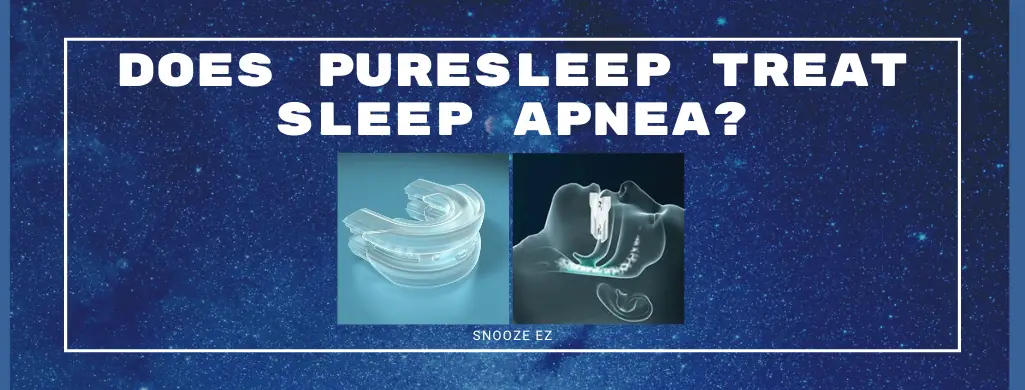No, PureSleep is designed to help with light snoring and not sleep apnea.
If you suffer from sleep apnea, you know how it can disrupt the quality of your sleep. You may be looking for a practical and cost effective way to get rest. But, does PureSleep really help with sleep apnea?
PureSleep is one of the most popular sleep aids on the market right. It is often used by people who can’t fall asleep or stay asleep due to snoring. The product claims to aid in stopping snoring, but does it also have an effect on those suffering from sleep apnea?
It has been debated whether or not PureSleep actually helps reduce symptoms of obstructive sleep apnea, so we did some digging to see what research says about this topic. In this article, we will discuss the effects of PureSleep and if it can help with sleep apnea.
What is PureSleep?
The PureSleep device is a mouthpiece. People also call these devices oral appliances, mouth guards, night guards, or dental appliances. The PureSleep mouthpiece claims to be an effective over-the-counter anti-snoring aid with the ability to open the back of the throat and upper airway for more improved airflow.
Its adjustable settings make it easy to customize its size to your bite, meaning that the device can fit snugly in any user’s mouth. In order to ensure that the device fits properly, users must first boil and then bite down on the mouthpiece while thrusting their lower jaw forward. After this initial fitting process, reboiling is also allowed up to three times; after this, no further adjustments can be made.
Overall, the PureSleep mouthpiece seems like a promising solution for those looking for an effective anti-snoring aid. As long as users are willing to invest some time into following the setup instructions and making sure they have a good fit, they may find that the supposed benefits of this device are well worth the effort.
Does PureSleep help with sleep apnea?
First, this is straight from the PureSleep manufacturer website: “PureSleep has only been cleared by the FDA to treat snoring — not obstructive sleep apnea (OSA), so it should not be used for this purpose. And if you have a far less common form of apnea called central sleep apnea (CSA), you must not use PureSleep or any other type of dental device to treat your condition. Please consult your sleep specialist to explore the possibility of using a dental device to treat your OSA.”
So no, PureSleep is not made to help with sleep apnea.
Though, have people with sleep apnea tried it and gotten positive results? The short answer, some probably have, and some have not. It is not really known. What we do know, is that there have been many who have tried different types of mouth guards, not just PureSleep, and swear it cured their sleep apnea. Then, later find out from their updated sleep study, or visit from the doctor, that they are still have apneic episodes in the night even though their snoring has stopped or gotten less severe.
Then, there are some who have actually had success with mouth guards curing their mild to moderate sleep apnea after being reevaluated. Though again, there is no known evidence that the PureSleep device specifically has helped with sleep apnea.
What mouth guards help with sleep apnea?
A prescribed mandibular advancement device, or mouth guard, can be very useful for those with obstructive sleep apnea (OSA) in mild to moderate cases. Studies have shown that these type of mouth guards can help open the airway and reduce snoring, as well as decrease the number of episodes of apnea during sleep.
Unfortunately, over-the-counter devices are just trial and error when it comes to finding what may work for each individual. The best way to be sure a mouth guard will help with sleep apnea is to consult with your doctor, ENT, or dentist. They can make and mold one specifically for you. This is the only for-sure way to treat sleep apnea with a mouth guard that is similiar to a PureSleep device.
What are other ways to treat sleep apnea?
- Weight loss: Shedding excess weight can be helpful in reducing the severity of symptoms.
- Changing sleep position: Sleeping on your side, or stomach, instead of on your back can reduce the risk of airway blockage. Also sleeping elevated or on an adjustable bed can help.
- Avoiding alcohol and sedatives: Alcohol and sedative medications can make sleep apnea worse, so limiting their use may be beneficial.
- Nasal spray and strips: Nasal sprays and breathing strips can help open up the nasal passages while sleeping, allowing for easier breathing. Though, nasal strips alone do not help.
- CPAP (Continuous Positive Airway Pressure): This is the standard treatment that you probably already know. This type of therapy uses a device that provides a steady stream of pressurized air through a mask, which helps keep the airways from closing off throughout the night.
- Surgery: In some cases, surgery may be necessary to remove obstructions in the throat or sinus cavity that are causing apnea episodes. An ENT can direct you.
- Stimulation Therapy: Electrical stimulation of certain nerves involved in controlling upper airway muscles might help keep them active and prevent obstruction during sleep. This is an implant. A popular one is by Inspire.
Conclusion
No, PureSleep is not designed to help with sleep apnea. Though, some people have had success using different types of mouth guards to reduce their symptoms. The evidence is inconclusive whether PureSleep specifically has helped people with sleep apnea. If you suffer from sleep apnea, it is best to consult your doctor and explore other treatment options that may be more effective.


